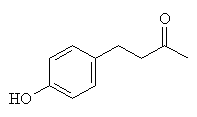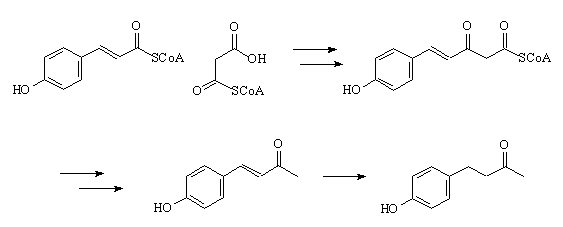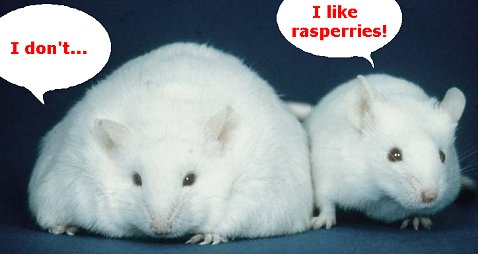Grifalconi Emanuele, Pucci Riccardo

INTRODUCTION
There has been a lot of buzz in the media about raspberry ketones lately, especially ever since Dr,Oz mentioned these substances on his TV show and touted them as a wonderful fat burning aid recently. So what are they, what do they do and can they really help you burn more fat and achieve the lean body you want? We will explain what these substances are and what kind of action they have in our bodies in just a moment. But the exciting news is that they do seem to be able to help us burn fat and stay leaner. Let’s explore these wonderfully aromatic compounds closely so you can understand their actions and what impact they can have on your body goals.
They can be ingested orally and metabolized when they are in the blood stream they have effects on lipolysis on our fat cells.

ACTIVE MOLECULES DESCRIPTION
Raspberry ketone is a natural phenolic compound that is the primary aroma compound of red raspberries. The smell of raspberries is due to lots of molecules, but raspberry ketone is the "impact molecule",230 volatile compounds, associated with their particular smell. It also called Frambinone is evidently derived from framboise, the French word for raspberry. IUPAC name is 4-(4-hydroxyphenyl)butan-2-one. Raspberry ketone occurs in a variety of fruits including raspberries, cranberries and blackberries. It is biosynthesized from coumaroyl-CoA. Extraction of pure raspberry ketone. Raspberry ketone is used in perfumery, in cosmetics, and as a food additive to impart a fruity odor. It is one of the most expensive natural flavor components used in the food industry.
PREPARATION

Since the natural abundance of raspberry ketone is very low, it is prepared industrially by a variety of methods from chemical intermediates. One of the ways this can be done is through a crossed aldol-catalytic hydrogenation. In acetone and sodium hydroxide, 4-hydroxybenzaldehyde can form the α,β-unsaturated ketone. The 4-(4-Hydroxyphenylbutan)-2-one ,is synthesized from p-coumaryl-coenzyme A and malonyl-coenzyme A in a two-step reaction sequence that is catalyzed by benzalacetone synthase and benzalacetone reductase.
Aromatic Polyketide Synthases (Purification, Characterization, and Antibody Development to Benzalacetone Synthase from Raspberry Fruits),March 1996
OTHER WAYS FOR MAKING IT

It can be made in the laboratory by more than one route. One convenient two-step synthesis involves, first, the crossed-aldol condensation of 4-hydroxybenzaldehyde with propanone, forming (4-(4'-hydroxyphenyl)-3-buten-2-one). This double-bond in the side-chain can then be catalytically hydrogenated forming it.
Another method that has been described involves a Friedel-Crafts alkylation of phenol by 4-hydroxybutan-2-one, using a cation-exchanged montmorillonite catalyst

Raspberry Preparation,1996
Does it have any other uses, apart from flavourings?
INDICATIONS
Tests on mice indicate that it has an antiobese effect, believed to be due to its increasing lipolysis and fatty acid oxidation. As far as is known, no tests on humans have been reported. Just like other ketone bodies, raspberry ketones encourage our bodies to free up lipids or fats for fuel.
PHARMACOKINETICS
Raspberry ketones seem to do this by increasing the amount of glycerol in our adipose tissue (from fatty acid separation) as much as threefold. Additionally, they increase fatty acid oxidation while suppressing triglyceride accumulation. Simply put, they give our fat cells the signals to more freely release fat as fuel, and help our bodies resist fat accumulation. More precisely, red raspberry ketones do all this action by increasing the levels of a protein hormone called adiponectin.
Adiponectin is a hormone produced by our fat cells that regulates the metabolism of lipids and glucose in the fat cell, and also influences our own body’s response to insulin. This hormone decreases triglyceride production, has an anti-inflammatory effect in arterial walls, decreases glucose production in the liver, and increases insulin sensitivity.
adiponectin,February 2005

MOLECULAR MECHANISM
Adiponectin is the protein product of an adipose tissue-specific factor, isolated and termed APM1. Low levels of adiponectin are found in people who are obese, and high levels are seen in people who have a tough time storing fat. The net of this is that if your adiponectin levels are higher then you will more than likely have an easier time getting lean and staying lean. The higher amounts of raspberry ketones in your body means higher amounts of adiponectin, which means more fat released as fuel. Now you should know that these things don’t work in a vacuum and if your diet isn’t complimentary to fat burning then your results will be poor. After all, you can’t eat ten pizzas, take some rasberry ketones and think that your body won’t want to store extra calories as fat. But if your diet is right, and you are exerting more energy than you are taking in, then adding raspberry ketones can help you effectively raise adiponectin levels and in turn help you lose a much higher amount of body fat.
Can taking more red raspberry ketones help us stay lean, burn fat and achieve some to the body goals that we want? As you have probably already guessed from our earlier discussion the answer is yes. The evidence seems to suggest that raspberry ketones can help us lose fat and keep it off. I do believe that adding red raspberry ketones to your good daily diet in the form of a fat burner like Scorch or similar product can have a positive impact on your body’s ability to burn fat faster and help you keep it off.
effect on the adipose tissue,February 2012
PHARMACOGENOMICS 
The dietary administration of RK to male mice has been reported to prevent high-fat diet-induced elevation in body weight and to increase lipolysis in white adipocytes. To elucidate a possible mechanism for the antiobesity action of RK, its effects on the expression and the secretion of adiponectin, lipolysis, and fatty acid oxidation in 3T3-L1 were investigated. Treatment with 10 µM of RK increased lipolysis significantly in differentiated 3T3-L1 cells. An immunoassay showed that RK increased both the expression and the secretion of adiponectin, an adipocytokine mainly expressed and secreted by adipose tissue. In addition, treatment with 10 µM of RK increased the fatty acid oxidation and suppressed lipid accumulation in 3T3-L1 adipocytes. These findings suggest that RK holds great promise as an herbal medicine since its biological activities alter the lipid metabolism in 3T3-L1
ADRENERGIC RECEPTORS

This prompted us to examine the effect of RK on lipolysis in rat epididymal fat cells and the ability of RK to bind various subtypes of beta-adrenergic receptors. While RK failed to stimulate lipolysis in the absence of norepinephrine and failed to bind to beta 1, 2 and 3-
adrenergic receptors, it was successful in increasing norepinephrine-induced lipolysis. We find it noteworthy that RK has a lipolytic activity that takes place via a mechanism unrelated to that of synephrine. Noting that the rate-limiting step in lipolysis in fat cells, the hydrolysis of triacylglycerol, is catalyzed by HSL, we decided to examine the effect of RK on HSL activity in rat fat cells. We found that RK did not enhance the HSL activit. In another paper we reported that the conversion of the HSL translocation to its substrate on the surfaces of lipid droplets is a crucial step for triacylglycerol hydrolysis. When we examined the localization of HSL in fat cells in the present study, RK significantly increased the amount of HSL protein in the fat layer and concomitantly reduced that in the supernatant. This basically means that since binding to beta receptors typically co-stimulates the cardiovascular system, it can have negative after effects on the heart and the body. This is especially true for those that currently have heart or blood pressure issues, which are quite common in over weight to obese individuals. Put simply, raspberry ketone helps increase fat breakdown and increase fat burning by a number of different mechanisms. However, **it does so without stimulating the cardiovascular
system**, in stark contrast to other thermo genic supplements.
Anti-obese action of raspberry ketone,2005
SAFETY
Unfortunately little is known about the long term safety of raspberry ketone supplements. In 1965, the Food and Drug Administration placed raspberry ketone generally recognized as safe (GRAS) status for the small quantities used as a food additive. The first study was not blinded (not controlled for bias) and it examined weight-gain in a few male mice fed a high fat diet plus high dose raspberry ketone. It also analyzed some rat liver cells exposed to raspberry ketone. The second study was also not blinded (not controlled for bias) and did not involve humans or any other animal, but instead, just looked at fat cells exposed to raspberry ketone in a petri dish. Limited to one or two small studies done on rats we don’t know very much about the short or long-term effects of using raspberry ketones as a dietary supplement, which involves much higher dosages than are used in food manufacturing. Rats were fed on diets containing p-hydroxybenzyl acetone for 13 weeks. No effects on body weight were recorded in animals on diets containing 0·4% or less of the flavouring and food and water consumption was similar in all test and control animals. Transient changes in haemoglobin and leucocyte levels at wk 7 in animals on the highest dosage were considered unlikely to be of toxicological significance. Serum and urine analyses were comparable in all groups, except that a positive reaction for acetone was found in the urine of all treated animals. Further tests showed, however, that this was related to the excretion of p-hydroxybenzyl acetone or its metabolites and not to any pathological change. No other effects were seen at the two lower levels but animals given the two higher dosage levels showed slight increases in liver, kidney and adrenal weight relative to body weight. The types and incidence of histological findings were comparable, however, in the control and highest dosage groups. For people with high blood pressure, diabetes, kidney disease, anxiety disorders, or for who are pregnant or on asthma medicine, raspberry ketones are not advisable
Raspberry Ketone is not a Fat-Burning Miracle.,2012
Are Raspberry Ketones Safe?
Acute and short-term toxicity of p-hydroxybenzyl acetone in rats

RK
Wikipedia
Springer Link
BIOCYC
Wiley
Pubmed
Sciverse
WedMD
Thieme
Words On Wellness
Alternative Medicine